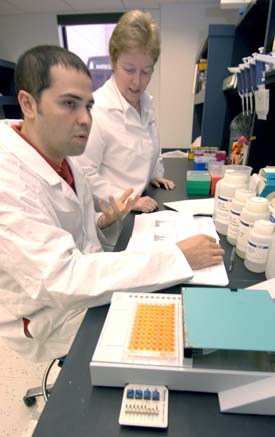Fish, tigers, insects. Name the creature, and young John “Keoni” Kauwe, Ph.D., wanted to read about it.
“I drove my mom crazy,” he says, “I made her check out every children’s book in the library about animals.”

That fascination with life science eventually led Kauwe, who earned a doctorate in evolution, ecology and population biology from the Graduate School of Arts & Sciences in December and will serve as a student marshal at Commencement, to help unlock the secrets of brain function.
“We wake up in the morning, and our brain just works,” Kauwe says. “But something we consider to be simple is actually the result of many complex interactions.”
Alzheimer’s disease can occur when something disrupts those complex interactions. The condition is characterized by protein deposits in the brain called plaques and tangles. The plaques, which are composed of amyloid beta, and tangles, which are composed of tau, interfere with normal brain function.
For his doctoral research, Kauwe — with the guidance of Alison Goate, D.Phil., the Samuel & Mae S. Ludwig Professor of Genetics in Psychiatry — used his knowledge of population genetics to identify the genes that control the levels of a-beta and tau in the brain. It was a task that helped him earn a Ford Fellowship and a Poletsky Award for Research in Alzheimer’s disease and resulted in 20 papers published.
“Keoni’s expertise in population genetics allowed him to apply novel, evolutionary-based methods to data from many of our lab’s projects,” Goate says.
“Very few people had applied these powerful methods to complex disease studies, and Keoni was the first to use them in Alzheimer’s research. As a result, he has significantly contributed to many research projects from our laboratory,” Goate says.
|
Graduate School of Arts & Sciences |
Kauwe first became interested in genetics as a freshman at Brigham Young University. After he proved to professors that he could be trusted to feed fish in the lab’s freshwater tanks, they invited him to become more involved in their research on genetic differences between subspecies of trout.
That experience inspired Kauwe to earn a master’s degree in population genetics at BYU and eventually apply to WUSTL, where his goal was to “merge population genetics with the mainstream human disease genetics,” he says.
He has succeeded in that goal, Goate says, and has proved to be one of her most promising students.
“Keoni combines creativity, intellectual curiosity, emotional maturity, hard work and generosity into a single package,” she says. “Even on days when he is extremely busy, he always finds time to help people.”
Helping people is something that comes naturally to Kauwe, a native Hawaiian who spent his high-school years on the state’s least populated island, Molokai. “While it’s nice that (Molokai is) a less commercial atmosphere, it also means there are fewer economic opportunities than on other islands,” Kauwe says.
Kauwe has seen how poverty and discrimination can limit individuals’ chances of achieving their potential.
“My success was because of the circumstances and opportunities I had,” he says. “Not everyone has those same opportunities. Those of us who are making progress have a responsibility to help others succeed.”
While at WUSTL, Kauwe has served as a mentor to minority students and was a member of the Division of Biology and Biological Sciences (DBBS) Diversity Steering Committee, where he helped institute a “second visit” opportunity for exceptional minority prospective DBBS students.
The program, in its second year, already has helped WUSTL attract many excellent minority students.
Since earning his doctorate, Kauwe has been actively recruited by several institutions for faculty positions and currently is working as a Hope Center for Neurological Disorders Fellow in the Department of Psychiatry in the School of Medicine.
He also recently took on a new challenge with his wife, Monica: parenthood. Their son, Sai, is 18 months old.
“It’s amazing to see the unconditional love coming from such a little guy,” he says.
At the thought of his little guy’s smile, Kauwe smiles.